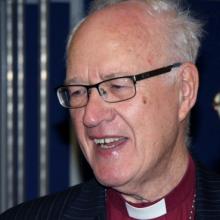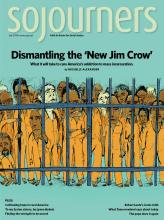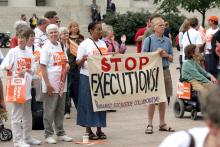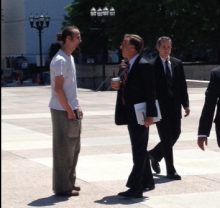Consistent Life Ethic


The 2014 election-year posturing forces me back to November, 2010, when a living parable walked into freedom after 15 years of house arrest. Aung San Suu Kyi, Burma/Myanmar's opposition leader, waved to her supporters and awakened our stagnant conscience.
Suu Kyi ranks among the elite of real-life parables. "I should be like them," we typically think. "Everyone should." They're the true norm. Saint Francis was one such parable. So was Gandhi. So were Mother Theresa, Nelson Mandela, and Alexsandr Solzhenitsyn. Pope Francis may be another. They shame our insipid, glitz-and-glitter leaders, whether they're overpaid CEOs or I'll-say-anything-to-get-votes candidates. They show us that politics is more than winning elections and business is more than making money.
In fact, they shame us all. We reward the attack ads. We elect the politicians and hire the CEOs. We diminish human beings to mere consumers and interest groups and file them into marketing categories. We breed our rant-and-rave culture and turn it loose.

“We cannot endure even to see a man put to death, though justly…We, deeming that to see a man put to death is as much the same as killing him” (Athenagoras of Athens, a Christian philosopher writing a defense of Christianity, speaking against state-sponsored killings and abortions, around 177 A.D.)
I am not sure where it originated, but somewhere someone started a rumor that if you are against the death penalty then you are soft on crime and care more about the guilty than the victim. Nothing could be farther from the truth!
Through marriage, a close relative of mine was murdered. I officiated the funeral. I attempted to comfort my family. I know the pain and evil of murder. I also know the pain and evil of a justice system that freed the killer after a few short years behind bars.
As a minister, and more importantly as a follower of Jesus, I take his words about visiting prisoners seriously (Matthew 25:36). I believe in forgiveness and grace and mercy. I believe in the Great Commandment (Matthew 22:34-40). I also realize you don’t get placed on death row for being a boy scout. People do need to pay for their crimes. The more serious the crime, the more serious the penalty. But ultimately, as a follower of Jesus, I believe in reconciliation. I believe in redemption. I believe no one is outside the realm of God’s mercy and grace.

It feels awkward and even a bit inappropriate to be talking about ‘celebrity news’ when so much is going on around the world: Iraq, refugees in Syria, children stranded at borders, Michael Brown’s death and Ferguson, Ebola, Ukraine, and the list tragically goes on.
But then again, it feels appropriate because it’s another reminder of the fragility of our humanity.
As has saturated the news, Robin Williams passed away this week. His life ended way too short at the young age of 63 – apparently because of suicide. While this was news to me, Robin had been struggling with intense depression – especially as of late — and was recently diagnosed with Parkinson's Disease.
To be honest, I don’t get caught up too much on celebrity happenings mainly because there’s not much genuine connection. I don’t really know them personally. Make sense? Robin Williams’ death – on the other hand – just felt like a painful punch in the gut. Perhaps, it’s because Mork and Mindy (Nano Nano) was the first TV show I watched (along with Buck Rodgers) after immigrating to the United States. I deeply resonated with Mork – this ‘alien’ or ‘foreigner’ from another land trying to fit in. Perhaps, it’s because so many of the characters he played in countless movies influenced me on some level as it did so many others.
A U.S. District Court judge declared the death penalty "unconstitutionall" in the State of California.
In the ruling that was released today, U.S. District Court Judge Cormac Carney wrote that, an "inordinate and unpredictable delay has resulted in a death penalty system in which very few of the hundreds of individuals sentenced to death have been, or even will be, executed by the State."
NBC Bay Area first reported the ruling:
In his 29-page ruling on the Jones vs. Chappell case, Carney wrote that when an individual is condemned to death in California, the sentence carries with it the promise that it will actually be carried out.
That promise is made to citizens, jurors, victims and their loved ones and to the hundreds of individuals on death row, he wrote.
However, Carney argues, “for too long now, the promise has been an empty one.”
Read the full story here.

Three leading Anglicans have entered an explosive debate about whether it is permissible for Christians to allow doctors in England and Wales to administer lethal doses of drugs to terminally ill patients given less than six months to live.
More than 100 members of the House of Lords, England’s upper house of Parliament, have asked to speak on the second reading of the Assisted Dying Bill on Friday.
The bill will be opposed by Archbishop of Canterbury Justin Welby, who is expected to reaffirm the Church of England’s traditional hostility to any move that would endanger the Christian principle of the sanctity of human life.

The Utah attorney general announced Wednesday that he will go straight to the U.S. Supreme Court to challenge an appellate ruling that declared the state’s ban on same-sex marriage unconstitutional.
Attorney General Sean Reyes decided to leapfrog the full 10th U.S. Circuit Court of Appeals in Denver after a three-judge panel last month upheld a lower-court ruling and declared that the U.S. Constitution’s guarantees of equal protection and due process extend to gay men and lesbians who want to marry. It was the first time a federal appeals court had ruled on the issue.
Besides Utah, the June 25 decision applies to Colorado, Kansas, New Mexico, Oklahoma, and Wyoming, but the circuit court put its ruling on hold, pending appeals.

The Supreme Court offered a further sign that it favors letting employers with religious objections avoid the Obama administration’s so-called contraception mandate.
Over the vehement objection of its three female justices, the court late Thursday blocked the administration from forcing evangelical Wheaton College to sanction insurance coverage for emergency birth control, even though it would not have had to offer the coverage itself.
In doing so, the court made clear that it’s not done with the religious liberty issue following the court’s June 30 ruling that closely-held, for-profit corporations with objections to certain contraception methods do not have to offer this type of coverage to their employees.

MICHELLE ALEXANDER’S The New Jim Crow, published in 2010, changed the way Americans understand racialized incarceration in the U.S. If W.E.B. DuBois made clear that the “color line” was the issue of the 20th century, then Alexander is teaching us that mass incarceration is the color line’s insidious 21st century version. Growing awareness, however, is leading to changed policies and restored lives for thousands. In this issue, Alexander lays out the challenges she sees ahead.

Ralph Reed’s recent Road to Majority conservative confab in the nation’s capital had an unlikely exhibitor in the conference hall: opponents of the death penalty.
The activists were in the right place because their opposition stems from conservative principles. Conservatives Concerned About the Death Penalty believe that the faithful who gathered at the annual event hosted by Reed’s Faith and Freedom Coalition are ripe for embracing their critical view of capital punishment.
They have their work cut out for them. Yes, support for death penalties has been dropping in a Pew survey — from 78 percent in 1996 to 55 percent last year. But this barbaric practice still enjoys strong preference among conservatives, with 69 percent expressing support in a June ABC News/Washington Post poll. Only 49 percent of liberals agreed. Among Republicans, support is even higher — at 81 percent.
So what kind of reception did the activists receive? The group’s advocacy coordinator, Marc Hyden, told me the response was very positive.

The U.S. Supreme Court is expected to finally issue its ruling this week in the highly anticipated case of the craft companies vs. Obamacare.
Technically, it’s Sebelius v. Hobby Lobby and Conestoga Wood Specialties, a showdown over the Affordable Care Act’s contraception coverage mandate. The core legal question is whether a private company can have religious rights.
But to the general public, this is seen as a showdown between employers — the evangelical Green family behind Hobby Lobby and the Mennonite Hahn familythat owns the Conestoga cabinet company — and the employees’ personal reproductive choices under their insurance.
While conservatives have cast the battle as one for religious freedom, the general public may see it as a showdown over personal health choices.

After an unusual six-week lapse in executions in the nation since a botched effort in Oklahoma on April 29, two men could face lethal-injection deaths in Georgia and Missouri Tuesday night or early Wednesday.
Wellons, 59, was sentenced to death for the 1989 rape and murder of 15-year-old India Roberts, whom he abducted as she was on her way to a school bus.
At 12:01 a.m. Wednesday, Missouri is preparing to execute John Winfield, who blinded the mother of his two children and killed two other women in a 1996 shooting spree. A judge on Thursday issued a stay of execution, but prosecutors are seeking to have it lifted in time for Winfield’s execution to proceed.
A third inmate, in Florida, is slated to be put to death Wednesday evening.

Nine days after my Dad’s memorial service on June 7, I am still in Detroit.
I am still in Detroit to volunteer as a member of the More Light Presbyterians communications team at the 221st General Assembly of the Presbyterian Church (USA).
I am still in Detroit because, for the better part of three decades, my father was an active member of the progressive movements within PCUSA for affirmation and inclusion, for peace with justice.
I am still in Detroit because my dear friends who got married on my former land in rural Tennessee could not have their vows acknowledged by church or state because they are both men.

It’s 93 degrees in Texas today. And Rev. Jeff Hood is walking 200 miles across the state. What would compel somebody to do that? He wants to end the death penalty … and he is not alone.
Rev. Jeff Hood is a Southern Baptist pastor, deeply troubled by his denomination’s stance on capital punishment. And he is troubled because he lives in the most lethal state in the U.S. Texas has had 515 executions since the reinstatement of the death penalty in 1976 – the next state in line is Oklahoma with 111. That means Texas is responsible for 37 percent of the executions in the U.S. Jeff has been a longtime organizer and board member for the Texas Coalition to Abolish the Death Penalty, a movement that is gaining some serious momentum these days.
A growing number of Texans — and Americans in general — are questioning the death penalty. A recent ABC poll shows we are over the tipping point, with more than half of Americans being against the death penalty and in favor of life in prison, putting death penalty support at a new low. For some it is the racial bias – in Texas it is not uncommon for an African American to be found guilty by an all-white jury. In fact, in considering “future dangerousness,” a criteria necessary for execution in Texas, state “experts” have argued that race is a contributing factor, essentially that someone is more likely to be violent because they are black – prompting articles like the headline story in the New York Times about Duane Buck: “Condemned to Die Because He is Black.”

Southern Baptist leader Albert Mohler wrote a piece last week defending the death penalty. In his 1,200-word argument for why Christians should support the death penalty, he does not mention Jesus a single time.
Digging deeper, as you read the official pro-death penalty statement of the Southern Baptists, there is not a single reference to Jesus or the Gospels.
There are plenty of other problems with the scriptural maneuvering used to justify the contemporary practice of the death penalty with a few verses from the Bible, in the same way that a few verses were misused to justify slavery. For starters the biblical death penalty was required not just for murderers, but also for folks that committed adultery, disrespected their parents, collected too much interest, had premarital sex, and disobeyed the Sabbath. But I want to stick with the nagging problem of Jesus, the greatest obstacle for pro-death penalty Christians.
In a recent Barna Poll, fewer than 5 percent of Americans think Jesus would support capital punishment, and fewer than a quarter of young Christians support it. Nonetheless some Christians find ways to sidestep Jesus, the lens through which all of us who claim to be Christians should interpret the Bible and the world around us.


After this week’s botched execution in Oklahoma, Albert Mohler, president of The Southern Baptist Theological Seminary, argued why Christians should support the death penalty at CNN.com. Grounding his argument in Genesis 9:6, where Noah is told that anyone guilty of intentional murder should be put to death, Mohler says, “The one who intentionally takes life by murder forfeits the right to his own life.”
In my experience, most Christian pro-death penalty advocates make similar arguments, rooting themselves in Old Testament teaching. On occasion, they bolster their thinking with a somewhat cryptic reference to the government’s ability to “bear the sword” to “bring punishment on the wrongdoer” by the Apostle Paul. Rarely, will anyone cite Jesus’ teachings.
Mohler is a capable theologian and a thinker I respect. And I have many intelligent friends who support the death penalty. Yet, I think it is problematic for Christians to root their support of capital punishment in the Jewish Scriptures.

In 2009, I accompanied my friend Steve Henley on his journey to execution in Tennessee. As his spiritual advisor, I was able to be with him for a few hours before he was removed from his deathwatch cell and strapped to a gurney. I was there with his family as the blinds were raised and as he tried to make them smile. I was there when he spoke his last words, when the poison entered his veins, when he began to turn blue, and when he finally was declared dead. This image of my friend, who I visited for 10 of his 23 years on death row, will stay with me forever. Steve’s execution lasted about 12 minutes.
Clayton Lockett’s execution lasted 43 minutes. All of those present at his execution — correctional staff, attorneys, media, the victim’s family, clergy, and others — will now live with the image of what happened in Oklahoma on Tuesday. The horror they witnessed will be with them forever, regardless of their opinion of Clayton Lockett. Though Oklahoma officials had all sorts of reasons to suspect that there might be problems with this execution — using an untested mixture of lethal injection drugs whose source was kept secret — they proceeded for the sake of expediency, leading to the inevitable cruelty that followed.
By all accounts, Clayton Lockett did a terrible thing. He shot and killed 19-year-old Stephanie Nieman in 1999, taking away her life and all its possibilities. Some might even say that Clayton Lockett got what he deserved for his crime. But was what the state of Oklahoma did on Monday really about Clayton Lockett?

The botched execution of Clayton Lockett in Oklahoma on Tuesday has refocused the nation on the inherent contradictions in the death penalty. But here in Wisconsin last week, an opera helped focus the attention of one community on the many human issues woven into the debate over crime and punishment.
In real life at the Oklahoma State Penitentiary in McAlester, a mix of lethal drugs injected into the body of Lockett caused seizures rather than immediate death. On stage in the opera version of Dead Man Walking, the drug machine clicks, hums, and whirrs with efficiency, leaving the fictional character Joe DerRocher dead on the stage.
Dead Man Walking — the book by Sr. Helen Prejean about her work with prisoners on death row and the families of their victims — became an award-winning movie in the mid-1990s starring Susan Sarandon and Sean Penn. It was recreated as an opera in 2000 and since then has played in 40 cities.
What happened in Madison, Wis., last week was more than the presentation of an opera. It was the culmination of six weeks of some 20 events engaging about 1,500 community members in discussion of many facets of the criminal justice system. The two performances of the opera itself drew about 3,000 people. It was a classic example of art engaging life.
Capital punishment itself is not so much of an issue in Wisconsin – the state has banned it since 1853. But Wisconsin does have the highest rate of black male incarceration in the nation. Its prison system tilts far more toward punishment than toward treatment and rehabilitation. It imprisons twice as many people as its neighboring and demographically similar state of Minnesota.

Last week, the men on Tennessee’s death row, four of whom have scheduled execution dates in the near future, invited Gov. Bill Haslam, the man who signs the death warrants, to join them for prayer
The backdrop for the story is that Tennessee has more executions scheduled in a year than the state has had in the past 50 years. Last week as Christians around the world remembered Good Friday, the day Jesus was executed, legislators in the Bible Belt state passed a bill to reinstate the electric chair (which would make it the only state to require death by electrocution). The only thing that could be more troubling would be if Tennessee decided to start crucifying people again. I even heard one politician defend his position saying, “It is God’s job to judge them, but our job to get them to Him.”